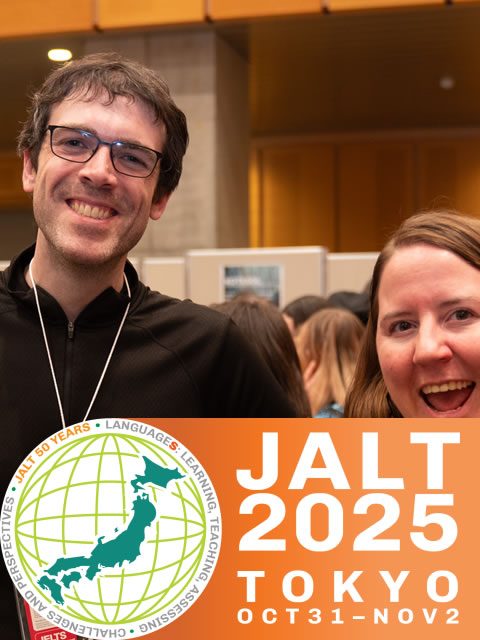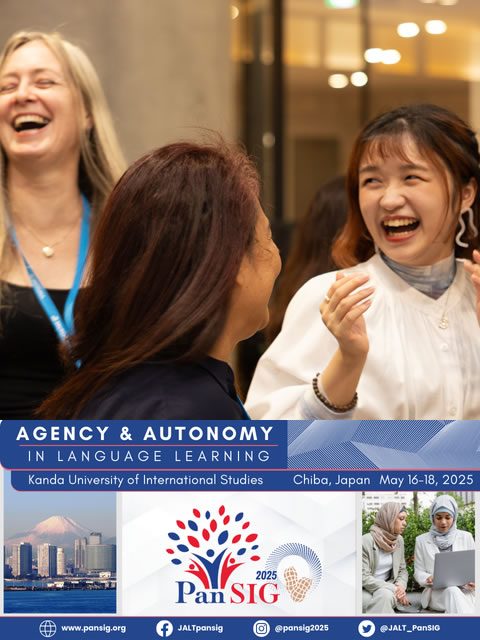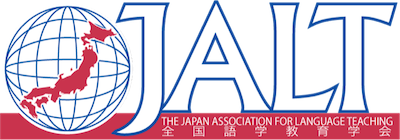Your cart is currently empty!
Plenary Speakers
•
The Plenary speakers for JALT2012 Making a Difference are (in order of appearance):
Jeannette Littlemore, University of Birmingham
John Eyles, Eyles and Associates, Ltd.; EON Foundation; co-sponsored by englishbooks.jp
Suresh Canagarajah, Pennsylvania State University
Özge Karaoglu, Terakki Vakfı Okulları, (JALT Junior Plenary)
Alan Firth, Newcastle University; co-sponsored by the Pragmatics SIG
They will be speaking in the Main Hall at ACT City in Hamamatsu on Saturday 13 October or Sunday 14 October. We look forward to seeing you there!
JALT2012 Plenary and Featured Speaker articles from the July/August edition of The Language Teacher (Vol. 36, No. 4) are available in PDF format. Use this link to download the PDF from the JALT Publications website.
Jeannette Littlemore
University of Birmingham
The role of metaphor and metonymy in EFL proficiency
I report the findings from a Cambridge ESOL-funded research project, which investigated how an ability to use metaphor and metonymy contributes to successful performance in the written component of Cambridge ESOL examinations. Learners are significantly more likely to do unusual things with metaphor at the First Certificate level (FCE). They do this in response to the very particular requirements of the examination. For these reasons, I argue that, at FCE level, it is important to adapt a tolerant attitude towards uses of language that some may refer to as “creative” but which others might simply describe as “wrong.” I also outline the different things that learners need to do with metaphor and metonymy at each level, illustrating my points with short examples taken from essays written by students who have been successful in their examinations.
Jeannette Littlemore is a Reader in Applied Linguistics in the Centre for English Language Studies at the University of Birmingham, UK. Her research focuses on the use of metaphor by second language learners. She is also interested in applying cognitive linguistics to second language learning. She is currently investigating the development of metaphoric competence in written and spoken learner English and variations in metaphor use according to genre and register. She has taught and lectured in Spain, Belgium, Japan and the UK and has presented at conferences in over thirty countries. She has published widely in the areas of metaphor, cognitive linguistics and language learning. Her books include Figurative Thinking and Foreign Language Learning (2006, Palgrave MacMillan, with Graham Low), Applying Cognitive Linguistics to Second Language Learning and Teaching (2009, Palgrave MacMillan) and Doing Applied Linguistics (2011, Routledge, with Nicholas Groom).
John Eyles
Eyles and Associates, Ltd.; EON Foundation
Technology as an Enabler
Sponsored by englishbooks.jp
Students walk into schools with networked multimedia computers in their pockets more powerful than put a man on the moon. Today learning is peer-to-peer and distributed. As information communication devices play an increasing part in our lives and the lives of our students, our role as teachers and the methods we use are inevitably changing. In the plenary session I will share examples of mass adoption English language programmes from around the world that are harnessing communications technologies in innovative ways and helping to support sustainable futures. Case studies will show tangible impacts on learners and communities. As well as exploring how technology is making a difference, pitfalls and concerns will also be discussed. Finally a glimpse at the future and an invitation to consider what the world requires of language teachers at this time and the role technology has to play as an enabler.
John Eyles is currently Visiting Fellow at AUT University, Chair of the EON Foundation and Managing Director of an education consulting company. He has been a pioneer of technology enabled learning for the past 15 years. Most recently working on projects for the BBC and Urban Planet Mobile that use mobile phones to teach English. Prior to this he was Head of Research and Alliances at Telecom New Zealand–looking three to five years into the future at opportunities and threats for the business, a Senior Lecturer at Auckland University of Technology and CEO of English-To-Go Limited, which in association with Reuters news ran the world’s largest lesson in 2001. He has led one of New Zealand’s largest English language schools, worked in Europe, the Middle East and South East Asia and spent 6 years in Japan as a university lecturer and consultant to the Japanese government. Visit http://www.johneyles.info
Suresh Canagarajah
Pennsylvania State University
From the Periphery to the Center: Making a Difference
As global English acquires local identities, we are becoming acquainted with diverse professional communities with their own socially situated pedagogical practices. How do local communities relate to the wider professional community? What framework of relationships and values enable a more constructive negotiation of practices and richer professional discourses in language teaching? I will explore these questions by narrating my own development as an ESL teacher from Sri Lanka. I will compare the pedagogical preferences, professionalization practices and identification strategies in the periphery and center to show the ways in which I negotiated the tensions creatively for my own development. I will argue that such interaction between professional communities can help develop more constructive pedagogical practices and discourses in both the center and the periphery.
Suresh Canagarajah is the Erle Sparks Professor at Pennsylvania State University. He teaches World Englishes, Second Language Writing and Postcolonial Studies in the departments of English and Applied Linguistics. He has taught in the University of Jaffna, Sri Lanka, and the City University of New York. His book Resisting Linguistic Imperialism in English Teaching (OUP, 1999) won Modern Language Association’s Mina Shaughnessy Award for the best research publication on the teaching of language and literacy. He is a former editor of TESOL Quarterly and the current President of the American Association of Applied Linguistics.
Özge Karaoglu
Terakki Foundation Schools
Technology is for Everyone: Take the Leap!
JALT Junior Plenary
The immense and growing change in technology in the last decade has opened up a new door in education creating new opportunities to learn, collaborate and connect to each other by exponentially expanding the physical limits of school. This digital revolution has unleashed creativity and new insights with unlimited resources to facilitate language learning. Our newest generation has already demonstrated to us how it has impacted the way they learn, think and interact; pointing us to learning technologies and their potential uses in and out of our classes. This talk will explore the whys and hows of integrating technology in small steps; making learning fun with web tools that every teacher should know and take advantage of to heighten the learning experience in young learners’ classes. Hang onto your hats because technology is for everyone and we are about to take that leap!
Özge Karaoglu is an English teacher, teacher trainer and educational consultant in teaching young/very young learners, teaching with web-based technologies for international organizations, schools and institutes worldwide. She is the main author of Minigon ELT books and she is working for Mindactiva in the USA as the content and story coordinator of the Yes, I Speak English DVD series. She has been developing animations, digital games and smart phone applications with her young learners for the last four years. She has won many prestigious awards for her work including “Creativity and Innovation”, “Highly Commended 2010”, “Highly Commended 2011”, “Microsoft Award for Outstanding Teachers – Runner up” and most notably “ESU – Cambridge University New Writing Award” which earned her a visit to Buckingham Palace to receive her award from the Duke of Edinburgh Prince Philip. She has a blog where she writes about teaching English through technology and web-based tools. She is currently teaching young and very young learners in Turkey and enjoying every minute of it.
Alan Firth
Newcastle University
The social practice of practicing English: Learning lessons from outside the language classroom
Co-sponsored by Pragmatics SIG
Within applied linguistics, the bulk of extant descriptions and conceptualisations of L2 learning are based on observations of behaviour occurring within the institutionalised setting of F/SL classrooms. Thus, notwithstanding competing paradigms, methods, and theoretical frameworks, much of what we know with regard to L2 learning is inextricably linked to teachers and students in instructional environments pursuing the overarching institutional goal of developing students’ L2 competence (for a recent discussion, see Miller and Zuengler, 2012). So, for example, teachers ‘organise’ learning activities and students purposively engage in them, while roles such as ‘teachers’ and ‘learners’ are instantiated through talk and other activities. Contrasted with this is the relative paucity of research on L2 learning occurring outside F/SL classrooms – where L2s are used as part and parcel of the everyday lifeworld (Masuda 2012). Such settings might include the workplace, the home, service encounters, the media and the Internet. The aim of this paper is to explore L2 learning in the internet chat community of ‘Skypecast’, and to reflect on the implications of Skypecast interactions for our understanding and conceptualisations of L2 learning and L2 competence in ways that may inform what teachers do in classrooms.
Alan Firth is Senior Lecturer in Applied Linguistics at the School of Education, Communication and Language Sciences at Newcastle University, UK. His major research interests are institutional interaction, second language learning and use, and English as a lingua franca. In 2005 he co-edited (with Carolyn Baker and Michael Emmison) Calling for Help: Language and Social Interaction in Telephone Helplines (Benjamins). In 2007 Modern Language Journal featured a ‘special focus issue’ entitled ‘The impact of Firth and Wagner 1997: SLA Reconceptualized?’, which examined Firth’s work (with Johannes Wagner) on respecifiying the field of Second Language Acquisition. He has published in Applied Linguistics, Modern Language Journal, IRAL, Intercultural Pragmatics, Journal of Pragmatics, Discourse and Society, American Journal of Sociology, amongst other journals. His monograph Talk International: English as a Lingua Franca at Work will be published by Oxford University Press in late 2012.

JALT2025 International Conference
2025年10月31日(金)〜2025年11月02日(日) 東京都渋谷 国立オリンピック記念青少年総合センター Friday, October 31 – Sunday, November 02, 2025 • National Olympics Youth Memorial Center, Tokyo, Japan

PanSIG Conference
PanSIG 2025 will be held May 16-18 in Chiba. PanSIG is an annual conference organized by JALT’s Special Interest Groups (SIGs).
